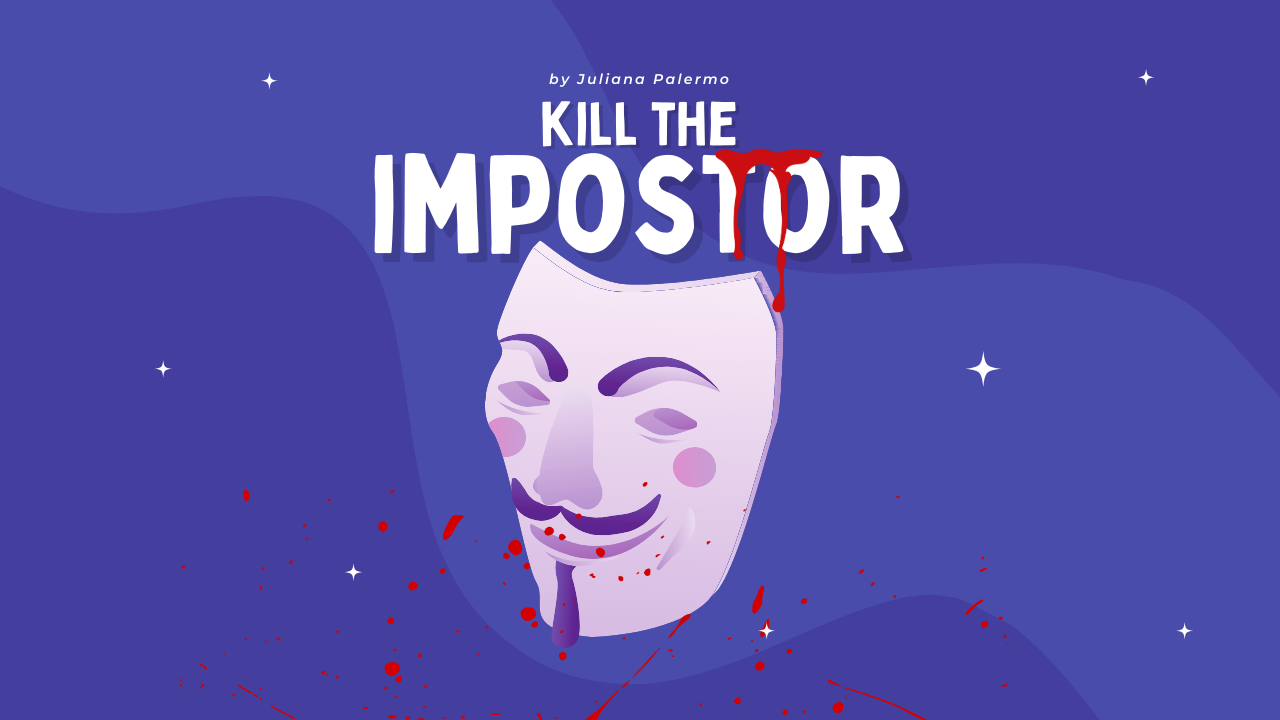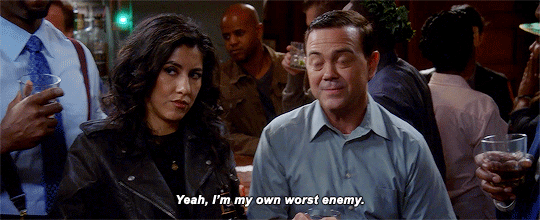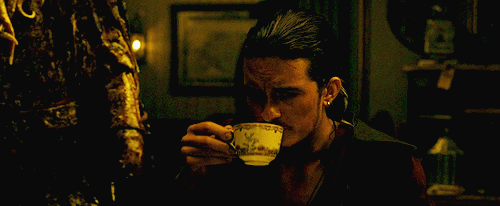
How often do you think you are not good enough? Are the voices in your head too loud when you try to write? Do you struggle with perfectionism and self-demand? When you look in the mirror, are you happy with what you see? Or you're always thinking you could do better? If someone gives you a compliment, do you take it? Do you believe it?
Writing is hard. Any kind of art is hard, as it demands a piece of your soul. But writing, when you're insecure, it's much harder. It doesn't matter if you are a beginner or a published best-seller, if you're really good or just mediocre, if other people like what you write or you don't share it, you always end up feeling like an impostor. Like, somehow, you managed to fool everyone around you into believing you are a good, creative and talented writer, when actually you are just crap.
This is called Impostor Syndrome, and it's very famous, very on trend right now. Every respectable artist wears it. But what does it actually mean? Are we all under the same social pressure of being perfect? Or is it just some individual problem we have to get through, one more test in our personal hero's journey? And if so, how do we win it?
What is impostor syndrome?
It's a psychological phenomenon that leads us to believe we are not good even when the literal evidence says otherwise. For example, our boss says we are doing a great job and we have excellent communication skills, but we believe that we are shy, not talkative enough, and that other people should get our position, because others deserve it more.
This happens a lot in different areas, art being the most common one, but work and social life are no exceptions. I have a friend that used to tell us he had fooled us into believing he is a good person, and even though we believe otherwise, he felt like he was only pretending to be good and was actually a really bad person.
This is obviously a distortion of the self image. And shows a lack of confidence and self-worth.
But besides that, impostor syndrome changes not only the way we see ourselves but the way we see our environment and our accomplishments and failures.
When bad things happen to me, I kind of deserve it. I think “well, this must be the consequences of my silly little actions”. But when good things happen, I have a hard time owning it. I never think it’s the result of my own effort and hard work, it's always luck and destiny or some god that happens to really like me.

This syndrome is very popular nowadays, there's a lot of Tiktoks, videos, and even full books that theorize about it. Partly, I think in our modern age there's a lot more talk about mental health than ever. In the last century, art was known by leading most of our writers, singers and artists to madness or death.
ALSO: Love, Hate, and Inner Sabotage
Since that, there has been a lot of talk about how creating something is related to sensitivity, and how to not destroy the individual while creating. But even with all this, it piqued my curiosity why we ignore the social aspects and try to dissect the problem as if it’s something that's inside every one of us.
Because if we think about it, we are not born with a concern of whether our art is good, we learn the duality later, upon the view of others. –With duality, I mean the separation between good and bad art, the concept of quality, that is always subjective but we tend to believe is a rule–. Also, when we do this, we generalize, assuming that we all feel the exact same way.
We do have a commitment to our work and we want to do something that's important, that can connect with other people, that we all share. But everyone is different, and everyone has a different version of what quality or perfection means. To get there, you can become very obsessive, or very experimental and have fun while doing it, you can carry a lot of frustration, you can become an impostor and feel like you're only worthy if your work is good.
There's a lot of human psychology that interludes with the creative process. So, as I do believe the social environment affects the individual, and that we’re all looking for the same thing, I think everyone has different emotional baggage to carry with them.
At the end of the day, everyone gets their own personal demon to have tea with.

Is it good or bad to compare yourself with other writers?
In an era when we’re all connected through social media, it's so much easier to see what others are doing and it's inevitable to compare your work with your peers’. This leads to a standard we all search to achieve. A finish line that might not be the same for everyone, but has to do with our own perception of success. For some, publishing a book, for others, getting a strong audience, for many, making money.
As we’re looking to achieve this goal, it's very annoying to see how others are doing. Let's say you do want to publish a book, but have a hard time writing the last chapter, and suddenly you go online and see that everyone – probably an amount of less than five people but in your head it's everyone – is publishing a book. How do you feel?
Envy of what others have or do is just dangerous and harmful. It will make you bitter. But the thing with envy is that, besides what everyone tells you about how it's so despicable, it can also be a compass. A terrible one, with a good sense of direction. What lies behind envy is a desire, and if you know what you want, then you know where you’re going.
ALSO: How to Celebrate Not Finishing Your First Draft
But the thing is that while we’re looking at others, they’re making progress. And we can suffer from that, or we can learn from them. It’s important to learn how to shut up our voices, the ones that say we’re not doing enough, or that we’re never gonna be successful.
Comparing yourself with your peers is not always bad, though. It can be very productive, creative and good for your learning. But you need to be ready to do that. When talking with other writers, don't look for what they’re doing that you can't do, think about what you like about them and how to be a little more like the people you admire. Admiration is even a better compass than envy.
And keep in mind this: whatever they’re doing might not work for you because the creative process is not a recipe, it doesn't work the same way for everyone. But also, what you might perceive as a sudden success, is probably not. Ask your writers how long they’ve been in the business, how many classes they take, how many rejection letters they received before the “lucky one” finally came.
ALSO: It Takes a Village to Write a Novel
The finish line
It's crazy to me that we keep pushing our limits, in order to achieve some mysterious goal that we set our minds to but doesn't really exist. I mean, when I´ll be good enough, I´ll publish my first book. But when would that be? When, on my own terms, will I be good enough?
That finish line, that we see clearly in our heads, doesn't really exist. It comes from our own insecurity that we´re not good enough now, but also the hope that someday, we will be. Everything that happens between now and that moment, is just a race that we keep running – and rushing ´til we can’t breathe – towards that goal that keeps walking away from us.
Because even though we get better at writing every day that we write, there´s always the possibility that we’ll be insecure for the rest of our lives. And If we continue to doubt ourselves this way, then we will never get to that moment of absolute satisfaction with our own art. It's just an endless race that we keep running until our feet bleed.
Or, until we stop being this cruel with ourselves.
Whatever comes first.
Death of your own ego
I don't think we’re in a race because we like to run. I know that I hate exercise, so it doesn't make much sense to me why I keep running so desperately. But the thing is, I´ve been thinking about this for a while now. I'm gonna tell you a secret, since you have been so patient with me and read my eternal rambling about the subject: I have spent years and years not writing because I thought I was too bad for it.
Looking back with perspective, I can't believe how stupid I was to let something so silly stop me. But it's true. And some days, I still believe that I should stop. Is it foolish to pursue something you might never reach? I don't know, but I'm determined to believe that those finish lines are just inside my own head. I pursue them anyway, because even if I can't ever stop running, I'm truly happy writing.
ALSO: Death of the Amateur
What I’ve learned these past years is that we’re constantly fighting against ourselves, in a confusing contradiction. We want to be seen, we want our stories to be read, but we’re too afraid to be even perceived. Because if we do, and we do it wrong, we will never forgive ourselves. It's like wanting love and affection, but isolating ourselves for the fear of being hurt.

And the most shocking one: we feel insecure with the things we create, because we have an ego so big that it could fit in a whole haunted mansion. We have such a hard time trying to be good, trying to make a work of art that we are proud of, because we don't stand the thought that maybe we suck. And if that would be the case, it would be alright.
Art doesn't have to be great to have the right to exist.
And we are allowed to suck, so, so, so bad. Still, we have a great resistance to this. Because no matter how low our self esteem is, we have a suspicion that we can be great. We have potential. And it’s the pursuit of that potential what eventually kills us, it’s the “almost there” that can make us run faster towards it, and if we hit the wall on the way, it can hurt us so bad that we stop running at all.
Behind all the frustration, all the tension and all the “Will I ever be good enough?” is always the ego.
ALSO: The Perks of Not Being Original Enough
Accepting that we are mere mortals that like to create can make wonders for our art, and our mental health. Letting go of that invisible race, all the burden and expectations that we have on ourselves can make us free. Ironically, it can make us even better writers.
When we just stop caring if we’re good or not, and we just enjoy it.
Kill the impostor and become the real writer that you are
How to stop running, then? How to stop comparing ourselves with other people? How to kill your ego and even more, how to start feeling like a real writer instead of an impostor that has managed to fool everyone around them?
I haven't even found a right answer that suits me yet, just fragments of things, like putting a puzzle together. I don't really know if there's a moment when we stop feeling like this completely. But just understanding why these things happen, can give us a new perspective and a chance to make things better.
Elizabeth Gilbert has an amazing ted talk that I will leave here. She talks about how she deals with her amount of incredible success. It's amazing to me that after all those years of dedication, when “Eat, Pray, Love” came out, all that people would say to her was “are you afraid you’re never gonna come up with a better idea? Is this the best you can do?”
But anyways, she said something very interesting about how ego is the reason all artists suffer. As I understand it, ego lies between sanity and death. Being able to cope with it can set us free, because we no longer expect that our work is gonna make us great artists.
Only by separating ourselves from our work we get to set ourselves free, we no longer suffer from failure, and we’re not entirely the reason behind our accomplishments. This idea used to bother me at first, but with time, I think there's something really valuable in her words.
In order to stop feeling like an impostor, we need to stop believing our value relies on our work. We can do great stuff and still be horrible people… or, we can make crappy art and still be wonderful human beings. Of course we can try both, but just because art makes us happy. Not because we search for validation in the views of our art. The entire world might not like it, but if we do, then what does it matter?
ALSO: When to Take a Break
The only thing that really keeps me going is my desire to create things that would last forever. –Fear of death? We can talk about it in our next session! Unfortunately, we’re running out of time– So, if none of this is helpful, the only thing left is to remind yourself why you write. Why do you put so much effort into this task, if not that it makes you truly happy?
Because if it does, I guess it doesn't matter if you’re a true writer or an impostor, you’re going to continue anyway. Desire is stronger than fear and insecurity. And the important thing is that you keep writing no matter what, because if you do, in time, you will become a better writer. The more the evidence grows, the more difficult it gets to deny it.
I assume you know what to do now.
But in case you need to hear it, you are not an impostor. You're a writer.
So go on, write.
Juliana Palermo
Written for The Plottery
Juliana Palermo lives in Buenos Aires, Argentina. She's 22 but hasn't learned how to do her taxes yet. She works as a freelance editor and book cover designer, but you will find her drinking coffee and daydreaming during working hours. She is currently writing her first fantasy novel. You can find her as @julippalermo both on Instagram and Twitter.
If you need her, you can say her name three times in front of a mirror and she will appear with a cynical smile. But let me warn you, her jokes are not as funny as she promised, and if you invited her in, there's a chance she will never leave.










